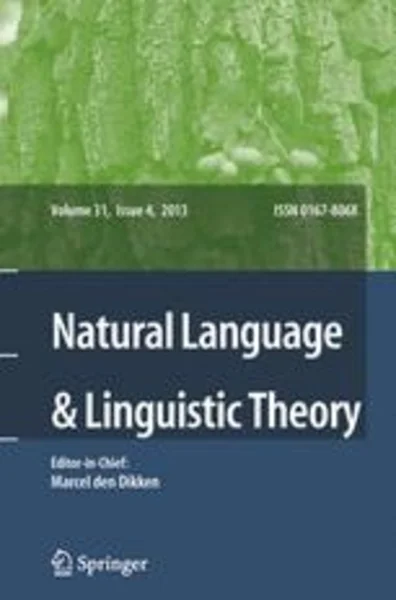-
when agreement is for number and gender but not person
جزئیات بیشتر مقاله- تاریخ ارائه: 1392/03/01
- تاریخ انتشار در تی پی بین: 1392/03/01
- تعداد بازدید: 293
- تعداد پرسش و پاسخ ها: 0
- شماره تماس دبیرخانه رویداد: -
in many languages, adjectives agree with a noun phrase in number and gender, but not in person. in others, ditransitive verbs can agree with their theme argument in number and gender, but not in person (the person case constraint). however, a unified account of these two similar patterns has rarely been attempted. in this article, i review how a single syntactic principle from baker (2008)—the structural condition on person agreement (scopa)—can explain both phenomena, in contrast to other existing proposals. i then go on to show how the scopa also accounts for five other environments in which verbs agree in number and gender (if relevant) but not in person. special attention is given to two entirely new cases: subject raising constructions in sakha and agreement with direct objects in ostyak. along the way, i also discuss the consequences of partial agreement for case assignment, using this to explain why non-scopa-compliant configurations sometimes result in legitimate partial agreement with a first or second person pronoun, and sometimes result in a structure being ineffable.
مقالات جدیدترین رویدادها
-
استفاده از تحلیل اهمیت-عملکرد در ارائه الگوی مدیریت خلاقیت سازمانی و ارائه راهکار جهت بهبود
-
بررسی تاثیر ارزش وجوه نقد مازاد بر ساختار سرمایه شرکت های پذیرفته شده در بورس اوراق بهادار تهران
-
بررسی تأثیر سطح افشای ریسک بر قرارداد بدهی شرکت های پذیرفته شده در بورس اوراق بهادار تهران
-
بررسی تأثیر رتبه بندی اعتباری مبتنی بر مدل امتیاز بازار نوظهور بر نقد شوندگی سهام با تأکید بر خصوصی سازی شرکت ها
-
تأثیر آمیخته بازاریابی پوشاک ایرانی بر تصویر ذهنی مشتری پوشاک ایرانی (هاکوپیان)
-
بررسی موقعیت گردشکردی و توسعه پایدار روستایی (مطالعه موردی: روستای دهه چشمه، استان چهارمحال و بختیاری)
-
توسعه آگاهی محیطی؛ کاربست الگوی آموزش پایدار در طراحی مدارس ابتدائی
-
نشانه های افسردگی در کودکان و راه های مقابله با آن
-
ارزیابی منحنی شکنندگی لرزه ای قاب های خمشی فولادی ویژه با نامنظمی جرمی در ارتفاع
-
آنالیز پلاستیک دال های دوطرفه با استفاده از شبکه های عصبی مصنوعی
مقالات جدیدترین ژورنال ها
-
مدیریت و بررسی افسردگی دانش آموزان دختر مقطع متوسطه دوم در دروان کرونا در شهرستان دزفول
-
مدیریت و بررسی خرد سیاسی در اندیشه ی فردوسی در ادب ایران
-
واکاوی و مدیریت توصیفی قلمدان(جاکلیدی)ضریح در موزه آستان قدس رضوی
-
بررسی تاثیر خلاقیت، دانش و انگیزه کارکنان بر پیشنهادات نوآورانه کارکنان ( مورد مطالعه: هتل های 3 و 4 ستاره استان کرمان)
-
بررسی تاثیر کیفیت سیستم های اطلاعاتی بر تصمیم گیری موفق در شرکتهای تولیدی استان اصفهان (مورد مطالعه: مدیران شرکتهای تولیدی استان اصفهان)
-
الگوپردازی و اعتبارسنجی پدیده تصمیم هراسی مدیران
-
مطالعه آزمایشگاهی بررسی بهبود بازیافت نفت با استفاده از سورفکتانت کاتیونی و پلیمر با فرآیند سیلاب زنی
-
توسعه پایدار؛ شکاف طراحی و اجرایی سد داریان هورامان
-
حقوق زندانیان از منظر فقه امامیه و حقوق ایران با نگاهی به اسناد بین المللی
-
boron nitride nanocone as an adsorbent and senor for ampicillin: a computational study




سوال خود را در مورد این مقاله مطرح نمایید :